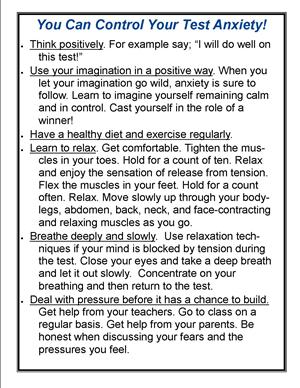Students at Shakopee East Junior High School will again take Minnesota Common Assessments (MCAs) in the areas of Reading, Mathematics, and Science this spring. Student performance data collected from these state-mandated tests is used to help influence educational decisions at both the district level and building level. Individual test performance on the MCAs is used to help guide instruction in the classroom and place students into appropriate classes through the course registration process. With that said, it is crucial that each and every student at West Junior High take these tests seriously and try their very best.
This web page is designed to help students and families prepare for the upcoming MCA "testing season." The online tests, themselves, are taken during the school day in one of the available computer labs. Students in the eighth grade will take three tests this spring: Reading, Math, and Science. Students in the seventh grade will take two tests: reading and math. You will find general test-taking information below. There are also links to grade specific practice pages found on the left.
Before the test:
- Be sure you are well rested.
- Eat a good breakfast.
- Be on time, and be sure that you have the necessary materials.
- DON’T STRESS! Just remember what you have learned in class, and you should do well.
- Be sure to bring any assistive device that you need, such as glasses or a hearing aid.
- Try not to miss class the day before the test. Your teacher may be reviewing important content.
During the Test
- Manage your test anxiety. See tips found on the right.
- Listen to the instructions of the teacher. It’s easy to miss important points that can affect your score.
- Read the directions carefully. If you do not understand a direction, raise your hand and ask for clarification immediately
- Take your time can concentrate! This is not a timed test and you will be allowed to complete it.
- Use your scratch paper. You are more likely to make a mistake when doing a problem in your head. You can also use your written work to help check your answer.
- Read the entire question, including all answer choices, and think about your answer before you make any marks on the answer sheet.
- Don’t spend too much time on any one question. If you cannot answer a question right away, select your best answer. If you have time at the end of the test, return to any questions you are unsure of.
- If questions contain negative wording such as NOT, read them carefully and be alert for the use of double negatives within a sentence.
- If you finish early, review your answers. Remember, your first answer is usually the correct one, so don’t change an answer unless you can convince yourself that your original choice is wrong.
- Try solving the problem in a different way to see if you get the same answer.


